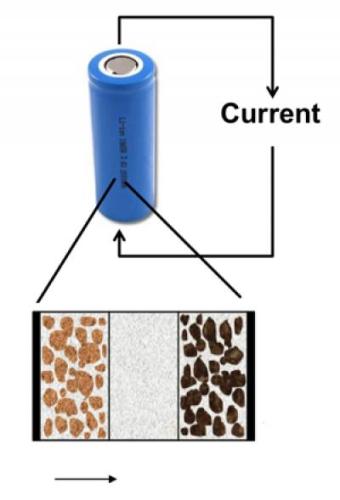A research team at Washington University in St. Louis (WUSTL) has been awarded a $2 million grant by the Department of Energy (DOE) to develop a battery management system for electric-car batteries. The School of Engineering & Applied Sciences has matched the award with a grant of $1.2 million.
 In a lithium-ion battery, the lithium is stored in metallic (uncharged) form inside the particles of a graphic electrode. During discharge the lithium comes to the electrode’s surface, where it is ionized, creating a current that travels to the cathode. At the cathode, typically a lithium-based alloy, the ions are neutralized and enter electrode particles as metallic lithium. The battery is recharged by forcing a current to flow in the opposite direction, moving the lithium back into the anode. Credit: MAPLE Lab/WUSTL
In a lithium-ion battery, the lithium is stored in metallic (uncharged) form inside the particles of a graphic electrode. During discharge the lithium comes to the electrode’s surface, where it is ionized, creating a current that travels to the cathode. At the cathode, typically a lithium-based alloy, the ions are neutralized and enter electrode particles as metallic lithium. The battery is recharged by forcing a current to flow in the opposite direction, moving the lithium back into the anode. Credit: MAPLE Lab/WUSTL
The DOE has designated this award through its Advanced Research Projects Agency-Energy (ARPA-E) new AMPED program, which recognizes battery management and storage innovations for improving electric vehicle technologies. The new round of ARPA-E grants will lead to better reliability and efficiency of the electrical grid. It will aid in reducing dependence on imported oil.
The Modeling, Analysis and Process-control Laboratory for Electrochemical systems (MAPLE) in the Department of Energy, Environmental & Chemical Engineering, at WUSTL has been awarded the grant. It is led by associate professor, Venkat Subramanian, who along with doctoral students Venkatasailanathan Ramadesigan, Sumitava De, Paul Northrop, Bharatkumar Suthar and Matthew Lawder will perform the study.
Lithium-ion batteries possess high energy density and do not lose charge quickly when not in use. Hence they are considered to hold great potential for electric vehicles. Lithium-ion batteries have certain drawbacks. They may heat up and explode if they are charged rapidly. To prevent negative effects, the batteries are designed so that only partial energy is utilized.
The researchers intend to increase the utilization to 100%, which will lead to lower vehicle weight. They plan to utilize spectral methods, which include simulation techniques, along with mathematical analysis to solve differential equations based on physics models. The team will develop a Battery Management System that will facilitate the maximum utilization of battery energy and also enable operation of the battery optimally throughout its operating life.